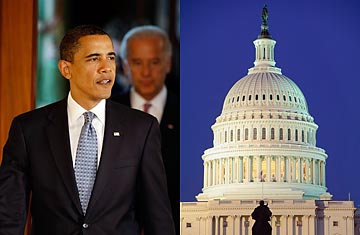
President Obama has made health-care reform a priority of his presidency
When Barack Obama informed congressional Republicans last month that he would support a controversial parliamentary move to protect health-care reform from a filibuster in the Senate, they were furious. That meant the bill could pass with a simple majority of 51 votes, eliminating the need for any GOP support. Where, they demanded, was the bipartisanship the President had promised? So, right there in the Cabinet Room, the President put a proposal on the table, according to two people who were present. Obama said he was willing to curb malpractice awards, a move long sought by Republicans that is certain to bring strong opposition from the trial lawyers who fund the Democratic Party.
What, he wanted to know, did the Republicans have to offer in return?
Nothing, it turned out. Republicans were unprepared to make any concessions, if they had any to make. But the encounter did make some Democrats wish they could see more of that kind of presidential engagement on the issue that Obama says is his top legislative priority. "I want the White House involved, maybe to be at the table," says Senator Chris Dodd, the second-ranking Democrat on the Senate Health, Education, Labor and Pensions Committee. "It's very important." (See five truths about health care in America.)
Thus far, Obama has largely stayed out of the negotiations that are going on in the House and Senate over health care. Studying the failure of the last effort to overhaul the health system in 1994, the Obama Administration has styled its approach to be the opposite of that of Bill and Hillary Clinton, who presented lawmakers with a complex bill that was more than 1,000 pages long. Obama has spelled out broad goals — expanding coverage and bringing down costs — but has pretty much left it up to Congress to decide how to do it.
Though Obama put forward his own plan for health-care reform during the 2008 campaign, he has signaled that he is not wedded to its specific prescriptions. His proposal, for example, included a "public plan" — one that would set up a Medicare-like, government-run coverage option for the uninsured — that has become one of the most contentious issues in the debate thus far. But in the face of criticism that a government plan would have an unfair advantage over private insurance, Obama has indicated sympathy for that argument. "Private insurance plans might end up feeling overwhelmed," he said. "So I recognize that there's that concern. I think it's a serious one and a real one. And we'll make sure that it gets addressed."
Privately, some Democrats on Capitol Hill say they fear the negotiations currently underway are drifting. And some on the left are worried that Finance Committee chairman Max Baucus is being too solicitous of the Republicans.
Meanwhile, time is running short. Both the House and Senate have set an extraordinarily ambitious timetable that would have the legislation passing each chamber by the time Congress adjourns for its August recess. Increasingly, the President's allies worry that they simply cannot get there that quickly without a much bigger investment of Obama's enormous political capital.
White House officials say the President does indeed plan to step up his game on health care in the near future, speaking out more on what he will and will not accept as part of the reform package. "As we move along, there's going to be choices we have to make, decisions we have to make and instructions we have to give. There's no question about that," says Obama's chief political adviser, David Axelrod. "You can expect that, as we turn the corner on this debate and discussion, he'll be speaking publicly and enlisting the support of the American people. We don't expect an immaculate conception."
But for now, he says, Obama is content to let Congress do its work. "The mistake you can make here is to be so wedded to an approach that you destroy your opportunity for a consensus," Axelrod says. "That's just not something we are going to do. This is too important." On health-care reform as in medicine, Obama is convinced that the right bedside manner can make all the difference in the world.
